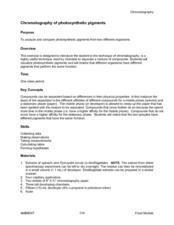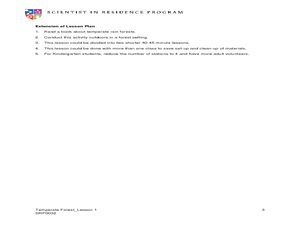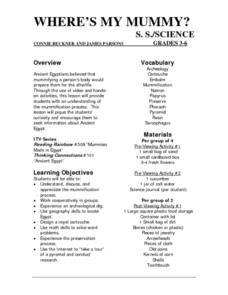Curated OER
Chromatography of photosynthetic pigments
Students explore the technique of chromatography to separate compounds in a mixture. In small groups, they separate by paper chromatography and identify the major and accessory photosynthetic pigments.....................................
Curated OER
Observation and Stimulation of bioluminescence and chemiluminescence
Students are introduced to chemical reactions, reaction rates, chemiluminescence, fluorescence and bioluminescence. They use glow sticks are used to demonstrate the effect of temperature on the rates of chemical reactions. Pupils recall...
Curated OER
Seed Socks
Students explore how seeds travel. In this seed disbursement instructional activity, students head outside in their bare socks. Students walk around then before going inside they take the socks off and examine what their socks picked up....
Curated OER
Models as Tools for Ecosystem Management
Fifth graders explore the concept of environmental management. For this ecosystem lesson, 5th graders discover how models help scientists learn more about managing ecosystems. Students create their own model, make observations and...
Curated OER
Exploring Forest Objects
Students explore the forest. In this ecosystems instructional activity, students rotate through sensory activity centers, brainstorm, and read about temperate forests.
Curated OER
This is Cool!
Third and fourth graders who are studying states of matter will enjoy this simple exercise. In it, they look at a picture of a girl in her kitchen, and they must circle five examples of materials that have changed states of matter as...
Curated OER
Vincent VanDuca
Students create art with the Manduca by placing gel on their body and letting them walk over colored paper. They discover what their footprints and movements are like. They create a piece of art by using the Manduca markings.
Curated OER
The good microbes
The question posed for the class to consider; What would decay and what would not? They read the short passage on decomposition and microbes, then mark the items that would decay after a two-week period. A scientific investigation idea...
Curated OER
Plant Diversity and Distribution
Learners construct a defined plot on school grounds and observed patterns in plant life. They count trees, shrubs, cacti and record on a data sheet. They compare data and generate a plant diversity overlook for their school.
Curated OER
In the Company of Wild Butterflies
Learners discover the life cycle of a butterfly and explain the different stages. For this exploratory lesson students watch a video and create insect art and they will get an opportunity to view live specimens of butterflies.
Curated OER
Living it up with plants
Have kids in grades K-2 discuss how they know a tree is alive. The worksheet provides simplistic background information and an observation check list. They check off the ways that they can tell an oak tree is a living thing. Note: The...
Curated OER
Germs and Your Body
Students study germs and ways your body fights against disease. In this germs lesson students complete an activity that demonstrates where germs can get into your body.
Curated OER
Biomanipulation
Students explore the effects of aquatic trophic relationships on water transparency. They observe and explain the effects of reducing nutrient inputs on agal density on water transparency.
Curated OER
I Wonder What Would Happen if Lots of Manduca Lived in a Small Place...
Students discuss the reasons why humans fight and look for similiarties in animals. They make predictions on what they think will happen when they observe insect crowding. They make conclusions about their predictions to end the lesson...
Curated OER
Where's My Mummy: Preservation Techniques
To observe preservation techniques firsthand, learners dry a flower in sand and compare cucumber slices soaked in salt water for a week with slices left out to dry in the open air. Video resources (not attached) include one about mummies...
Curated OER
Digestion Simulation
Students study the human digestion system and the functions of the stomach and small intestines. In this digestion instructional activity students view a demonstration on the process.
Curated OER
Manduca
Students investigate the basic survival needs of both hornworms and humans. They compare and contrast the them by making a class list.
Curated OER
Artifacts 1: What Can We Learn From Artifacts?
Sixth graders are introduced to artifacts and explore an online archaeological site to connect clues about how people once lived. In this deductive reasoning lesson, 6th graders participate in the stratigraphy game on Kids Dig Reed.com...
Curated OER
Kernels of Wisdom: Investigating Natural Variations in Corn
Here is a brain-popper! Corn, or more appropriately, maize, was intentionally domesticated by humans around 9,000 years ago and over a period of hundreds to thousands of years! Genetics and botany researchers have collaborated to find...
Curated OER
The Wonderful World of Slugs
Examine a slug? Of course, what else would a 2nd grader do with it? Pupils use clues and go on a slug hunt, read a slug story, or make a cooperative group mural of a slug's habitat. While older learners catalog slugs, go on a slug hunt,...
Curated OER
Illinois Biodiversity
Students examine the amount of biodiversity in the state of Illinois. They practice using new vocabulary and listening to stories about animals. After given time to reflect, they write their own haiku. They work together to create a...
Curated OER
The Root Show
Students investigate plant roots. In this plant instructional activity, students discover the function and structure of plant roots. Students plant a plant in a milk carton with a clear section cut out in order to observe the roots of...
Curated OER
Survival Zone: The Intertidal Zone
Students determine water level tidal predictions for a given place for the next month, current status of the area and the local weather. Links are provided for the information. Students answer questions based on the information found,...
Curated OER
Garbage in the Garden
Students create their own compost. In this soil lesson, students fill a bag with waste and soil, in order to create a mini compost bin. Students observe the baggies over a 6 week period, they record their findings and collect data on...

























